The "HGTV Effect"
House flipping looks so very easy on TV. Could the "flip" lead to another "flop" in the housing market?

“History never repeats itself, but it rhymes...”— Mark Twain
KEY POINTS IN THIS ARTICLE
- The housing market today is being driven, in large part, by those who are flipping homes. With 1 in 10 sales coming from house flippers, the highest level since—oh yeah—the housing bubble burst a decade ago.
- House flipping today is more profitable than in the past, driven in large part, not by rampant speculation, but through remodeling and updating older homes, which is very beneficial for communities.
- There does appear to be a media-driven aspect to all of this, propelled by the popularity of shows—particularly on the highly-ranked HGTV network—making all of this appear relatively "easy."
- Does this add-up to an "HGTV Effect?" If so, what does this portend for the housing market, and for the economy overall?
Each and every night, well over one million of our fellow Americans find an easy chair or curl-up on the couch to watch was is seemingly fast becoming the nation's favorite pastime. Looking at other people looking at houses in high-definition, of course! This has made HGTV consistently the third most-watched cable network in the U.S in prime-time!
Basic Cable Top 10 – Average Nightly Viewers (Prime Time Ratings, April 2019)
1. Fox News (2,339,000)
2. MSNBC (1,642,000)
3. HGTV (1,223,000)
4. USA (1,153,000)
5. TBS (1,033,000)
6. History (989,000)
7. Investigation Discovery (954,000)
8. A&E (926,000)
9. ESPN (921,000)
10. Discovery (917,000)
Source: Basic Cable Ranker: Week of April 1, Adweek, April 10, 2019.
All-in-all, this means that one media company, Discovery, Inc., owns three of the top ten basic cable networks: HGTV, Discovery, and Investigation Discovery!
And now, they are seeking to expand on their market position. Discovery has announced that next year, HGTV's indisputably biggest stars, Chip and Joanna Gaines, will launch their own network for the company, replacing the DIY network with a channel that will feature and be programmed by the couple of Fixer Upper fame. Their's is truly an American success story, as one day they are running a small real estate company and store in, of all places, Waco, Texas, and in a few years they have become megastars and built a personal brand that will likely bring them billions over the years! As the boxing promoter Don King famously says, "Only in America..."

Chip And Joanna Gaines
And so, for all the focus in our culture on politics and sports (with networks devoting much of their programming to shows where people yell at one another about both subjects), one thing is for sure... More and more of us are escaping the stress of daily life by watching other people find their dream home, whether it be in St. Louis or St. Lucia!

The American Dream of Home Ownership—30 Minutes in the Making on HGTV!
This has made stars and, quite literally, big-time brands out of not just the Gaineses, but a whole host of good looking couples who help people remodel their existing homes, or one's that they "shop" for in the show (though, SPOILER ALERT, the "reality" of HGTV's "reality shows" is very, very debatable!). This includes couples such as Erin and Ben Napier of Hometown (who have made a tourist destination out of—again, of all places, Laurel, Mississippi).

Ben and Erin Napier
Steve and Leanne Ford of Restored by the Fords, and, of course...

Leanne and Steve Ford
Jonathan and Drew Scott, a.k.a., the Property Brothers.

The Property Brothers—Jonathan and Drew Scott
Of course, every remodel (on TV at least) always results in the property owner seeing their home value rise thanks to the renovations, and yes, it really only takes 30 minutes to completely redo your entire house. Yeah, right!

Besides a whole slew of house hunting shows both in the U.S. and abroad, where "interesting" couples shop for always diverging tastes in homes and, of course, they only choose from the three homes that their real estate agent shows them (that's how it works in real life, right?), arguably the staple of HGTV's array of programming is centered on house flipping. This term has come to have a generally understood meaning, which, according to the Business Dictionary is:
"A quick-profit strategy in which an investor purchases real estate at a discount price and improves the property in order to sell it at a higher price. This can be a very lucrative profit strategy if the housing market is doing well (emphasis added)."
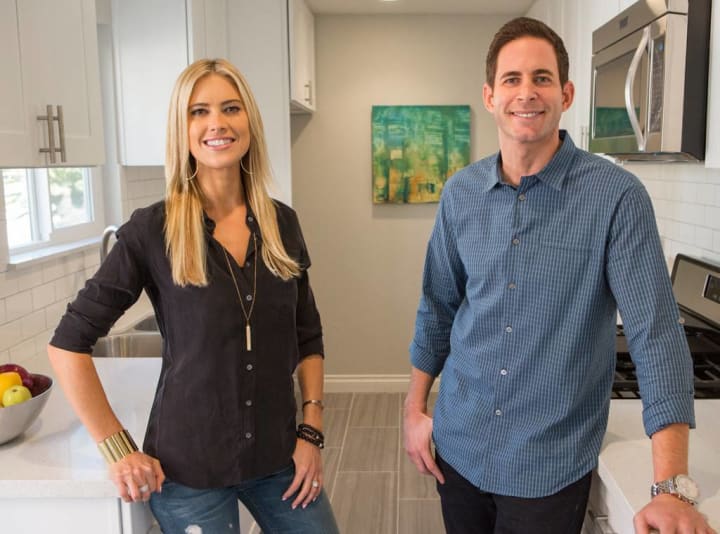
Christina Antstead and her now "Ex," Tarek El Moussa, of the original, Flip or Flop
Of course, the "we can make a show out of house flipping" phenomenon all started with Tarek and Christina with the aptly titled Flip or Flop. Of course, if you follow the celebrity headlines of the day, the telegenic, seemingly-perfect couple have now divorced and went their separate ways in their personal lives. But, as the classic show business adage goes, "the show must go on..." and so it does!
And today, not only is the original show continuing with some "tension," shall we say, built into the dialogue, but Flip or Flop has spawned a whole series of almost "franchised" shows built on the same format. From Las Vegas, to Atlanta, to Nashville, to Palm Springs, to Fort Worth, and likely more to come, the roster of house flipping shows on HGTV alone continues to grow. And if you look across the entire cable television and program syndication landscape, shows based on the premise of flipping homes are proliferating almost like Jersey Mike's franchises.
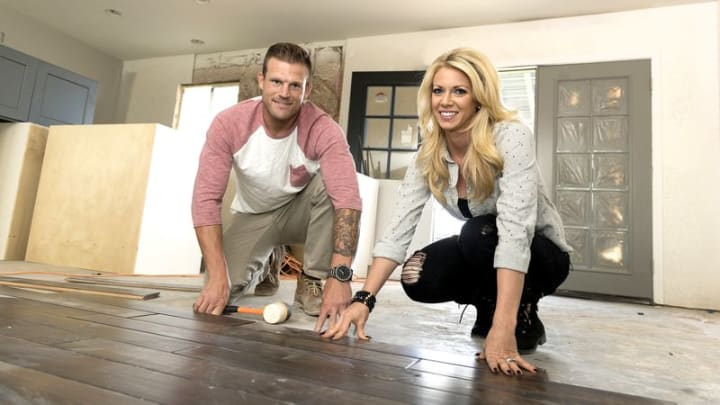
Bristol and Aubrey Marunde of Flip or Flop: Vegas
My knowledge of HGTV (and yes, it's thanks to my wife!) made me read with great concern though a recent article in the Wall Street Journal. That is because, while the article is titled, "House Flipping Is Back to Pre-Crisis Levels. Here’s Why It’s Less of a Concern: Flippers today have much larger profit margins than those at the peak of the previous housing cycle," knowing HGTV as I do—as a good, middle-aged husband, I probably took a much different message away from the piece than the author, the WSJ's housing reporter Laura Kusisto, likely intended.
Now I would highly recommend Kusito's article, as it is a very good overview of the American housing market and the impact that flipping has had on it, both in the past and in the present day. The article is based on a recent report on the market impact of house flipping from the Irvine, CA-based CoreLogic, a leading provider of consumer, financial and property data, analytics and services.
Kusito's WSJ piece shows that as opposed to the "no money down" home buying and rampant financial speculation that helped bring on the housing collapse and the Great Recession a decade ago, today's flippers are not merely in the housing market as a gamble. Rather than being a speculative financial play hoping for quick appreciation in the overall market, by and large, current house flippers have solid business models.
In actuality, most of today's flippers are doing basically the same thing that you can see Tarek and Christina, or any of the other Flip or Floppers, do on HGTV each and every night (and day). They are taking older properties, bringing them up to date and elevating them to move-in condition. Then, today's flippers are selling them for far more profit today than house flippers saw in the last housing boom of the mid-2000s. So yes, because the focus is on actually improving, rather than just reselling homes, many neighborhoods across the country are being restored one house flip at a time. In the process, a number of people are making a good living by inarguably doing good for their communities, and themselves, through flipping homes.
The overall impact of house flipping in the U.S. housing marketplace today simply cannot be disputed. The proof is in the data. CoreLogic has been tracking the U.S. housing market for two decades. A "house flip" is technically defined as any home that is sold after being owned for less than two years by the present owner. Their analysis shows that in the last quarter of 2018, 10.6% of all home sales in the country were flips. This figure is concerning in two ways though. First, it is approaching the all-time high for flipping activity, which occurred in the first quarter of 2006, when 11.3% of homes sold were flips. Also, the reported 2018 figure was the highest fourth-quarter level for flips in the two decades CoreLogic has tracked housing data!
And while CoreLogic's research shows that the profitability of house flipping, while down at present from peak levels, is far, far greater than in the period that lead to the burst of the housing bubble now more than a decade ago. As one can clearly see in the graphic prepared by CoreLogic for the Wall Street Journal piece, the profitability of house flipping peaked in 2011 at almost 40%! And while the economic profitability seen by house flippers has fallen by half since that peak, though still producing returns on average in the 20% range, this is double and even triple the profitability experienced by those who were engaged in flipping in the euphoric pre-housing bubble days of the early to mid-2000s! So, house flipping is an attractive prospect for investors, producing more consistent and higher gains than even the seemingly red-hot, but volatile, stock market today! And from Kosito's perspective, the extra profit margin "offers current flippers more of a cushion if home prices begin to flatten or fall."
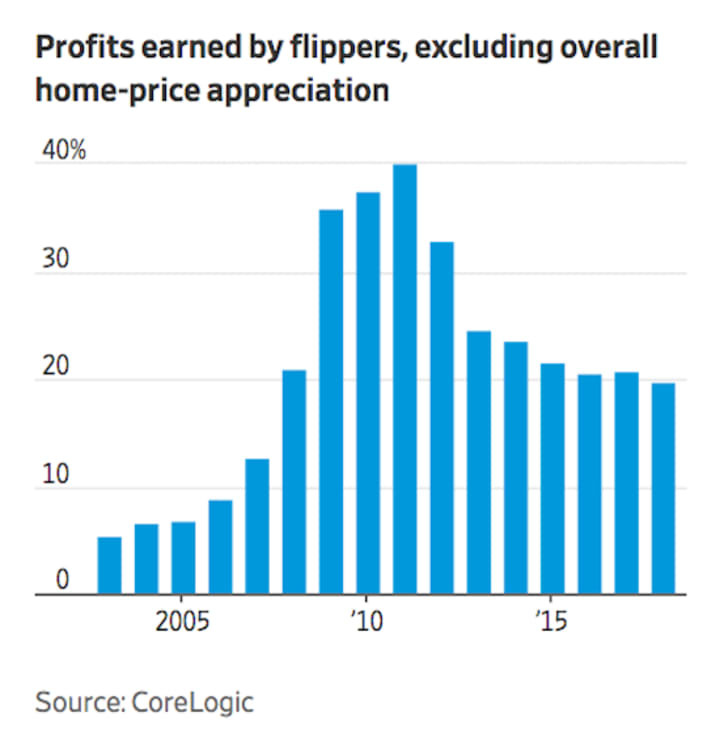
However, a deeper analysis of the CoreLogic data on the returns to be gained from house flipping though reveals some trends that definitely should cause some level of concern for those who would try to follow in the footsteps of their TV role models and begin flipping homes for a living. The first area of concern should be that more and more, home flipping is not the "mom and pop" operation depicted on cable television shows. Rather, it is increasingly a big business! Consider this one telling statistic: In the fourth quarter of 2018, corporate sellers made up approximately 40% of all sales that were categorized as being "flips." This number is three times the high seen in the peak of the last housing boom! Large, corporate house flipping is becoming the norm, rather than the "plucky couples" who are working independently to flip one house at a time, as shown over, and over, and over again on these cable TV house flipping shows. Consider that one company alone discussed in Kusito's article, Memphis Invest, works with a thousand properties a year across much of the south!
And a related point should also be concerning for those who might think about following in the footsteps of their heroes like Tarek and Christina: While the overall profitability of house flipping is, no doubt, an attractive investment, returns vary greatly based on the location of the homes. In the Memphis market, specifically house flippers, saw returns of on average 42%, approximately double the national average! Thus, where you are matters. And remember, larger entities with more regional presences can spread their risk, and returns, around in ways that the majority of house flippers cannot. So, the very real market-specific risk of having one's work concentrated in one particular city, or even one particular metropolitan area, as is depicted in the HGTV house flipping shows is something that favors larger, more corporate entities in the home flipping market.
Most of all, however, I was struck by one particular comment in the article that really alarmed me. This was when, Ralph McLaughlin, Deputy Chief Economist with CoreLogic, observed that:
“Flippers are very different today than they were in the past. Even though we see hype and hysteria in popular culture, this isn’t necessarily something to worry about” (emphasis added).
Uh... welcome to the world of 2019. As a strategic management consultant and professor, I would have to say that "hype and hysteria" basically are the twin goals of the media and marketing today. For good and for bad, for left and for right, and yes, for profits, the masses can be rather easily swayed (sadly) by all that we see on our televisions, our tablets, and our smartphones today.
So, I would like to enter the debate over how popular culture affects real commerce with a new term. I will coin this as the "HGTV Effect." This refers to the way in which the collective media attention to house-flipping has impacted—and will continue to impact—the American housing market. While HGTV is certainly the recognizable leader in promoting the cultural popularity of house-flipping, one can point to any number of other television shows, TV networks, bloggers, social media influencers, and sites who are doing their part to help, whether intentionally or inadvertently, to add to the froth in the U.S. housing market. I would argue, and quite reasonably so knowing the documented and demonstrated power of influencers in today's world of marketing strategies, that the ability of cable television stars to influence and to exacerbate house flipping activity is quite present in the American housing market and there collective impact is likely far more powerful than anyone can imagine.
While measuring the true power of the "HGTV Effect" will be a difficult academic and research task, it is perhaps more important that there be a recognition that this is a very real phenomenon, and it is one that all participants in the housing marketplace need to be aware of going forward. With all the hype. With all the media pressure. With all the star, power. House flipping is—and will continue to be—a powerful force in the U.S. housing market. As said at the outset, there is a very real, demonstrable good that comes out of all of this from the fact that older homes are being updated to current standards and tastes. However, I do believe from my perch as a business and social media "expert" that while there are indeed savvy real estate/remodeling folks who will be able to take advantage of this and do good for themselves and for their communities, there are others that, well, will say, "Hey honey, I think that it's time that we get off the sofa and get in on all of this! Let's see how much we can withdraw from our retirement plans and maybe get a second mortgage. Heck, this is such a great opportunity that we need to check the limits on our credit cards! Hand me that phone..."
In the end, I worry that, as the saying goes, we have seen this movie—or in this case the television show—before! We have seen our world rocked again and again and again by "irrational exuberance." This is the phrase used by the then-Federal Reserve Board chairman, Alan Greenspan, in a speech given at the American Enterprise Institute during the height of the Dotcom Bubble of the late 1990s. Booms and busts. History is literally full of them, and not just in the United States, but around the world! From "Tulip Mania," to the "South Sea Bubble," to the "Roaring Twenties," we have seen markets explode and then contract violently. Many people have made vast amounts of wealth during these periods, while others, generally those who are late to the "party," lose just as much if not more—sometimes much, much more in their effort to "play the hot hand."
We have seen the housing market itself rise, rise, and then fall, fall, and then fall even more just a little more than a decade ago! And so, in the end, the residential real estate market should be an area where individuals would be particularly hesitant to make big bets. And yet, the data clearly shows that, for now, house flipping continues to be a very, very profitable enterprise. And with the constant reinforcement—and yes, encouragement—provided on very popular cable television shows 24/7 and even on demand, people cannot help but be influenced by the "HGTV Effect!" Unlike Mr. McLaughlin, I very much believe that the "hype and hysteria in popular culture"—specifically the proliferation of house flipping shows—is definitely "something to worry about!”
In sum, this is a very complex issue, and one that bears monitoring and is worry of a great deal of academic and applied research. However, I do believe that the "HGTV Effect" is very real and I think it is a force to be both studied and reckoned with in the marketplace. I do fear, however, that many people today could be susceptible to the "reality" of too many real estate shows that may not depict the true reality of all the hard work and all the very real financial risk that is inherent in house flipping. After all, every one of these HGTV shows ends with a graphic showing just how much money that the good-looking couple has made, and with some form of the adage, "There's another house to flip!"
Now, I'm not tossing this new term out there to be a "party-pooper" or a naysayer. However, if unfortunately in five years we see some very significant downward movement in the housing market, I do strongly believe that the "HGTV Effect" may well be one of the factors at play. I hope that I am wrong, and yet, history, hype, and the housing market are all seeming to converge in this moment!

About David Wyld
David Wyld ([email protected]) is a Professor of Strategic Management at Southeastern Louisiana University in Hammond, Louisiana. He is a management consultant, researcher/writer, publisher, executive educator, and experienced expert witness. He is the founder and publisher of both The IDEA Publishing [The Best in News, Information and Content Marketing] and Modern Business Press [The Best in Academic Journals].
David Wyld’s Online CV
Social Media Links to David Wyld:
on Facebook
on Twitter
on LinkedIn
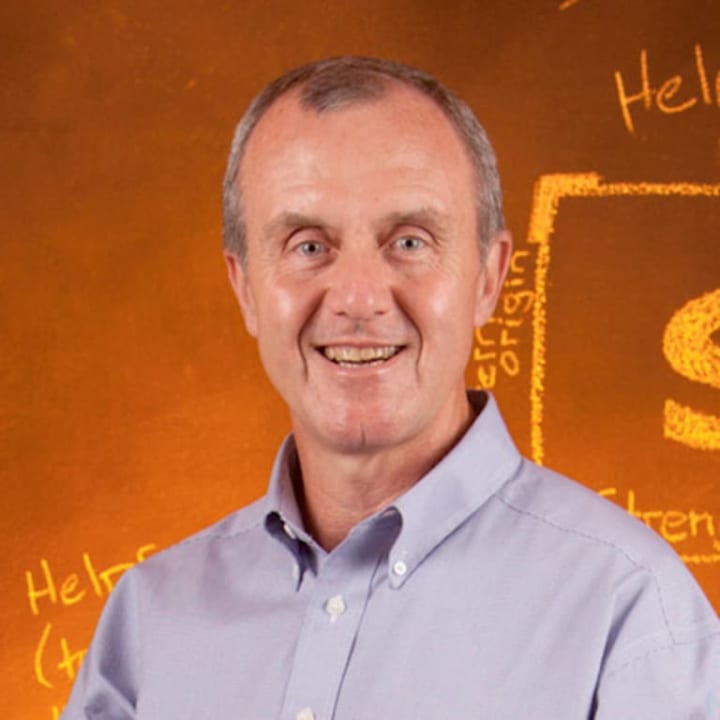
Professor David C. Wyld
Show your support for Professor Wyld and this platform
Like what you just read? Did it make a difference to you? If so, please see and share this article through social media, email, and even the old-fashioned way of printing it off for a colleague or friend!
And while you’re at it, ask yourself a simple question: Was the info worth a buck or two—or perhaps a whole lot more to you, your career, your company? If so, please consider “tipping” (after all, it is the polite thing to do!) using the easy link below. In providing a small tip, you not only help support the author's work, but you help keep the unique platform that Vocal Media is building be an advertising-free environment—and don't we all need more of that to make our online experiences better today? Please consider showing your support below and voting for good, ad-free ideas on the web!
About the Creator
David Wyld
Professor, Consultant, Doer. Founder/Publisher of The IDEA Publishing (http://www.theideapublishing.com/) & Modern Business Press (http://www.modernbusinesspress.com)




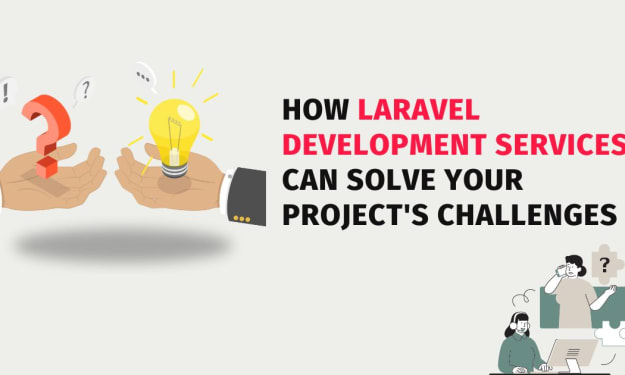

Comments
There are no comments for this story
Be the first to respond and start the conversation.